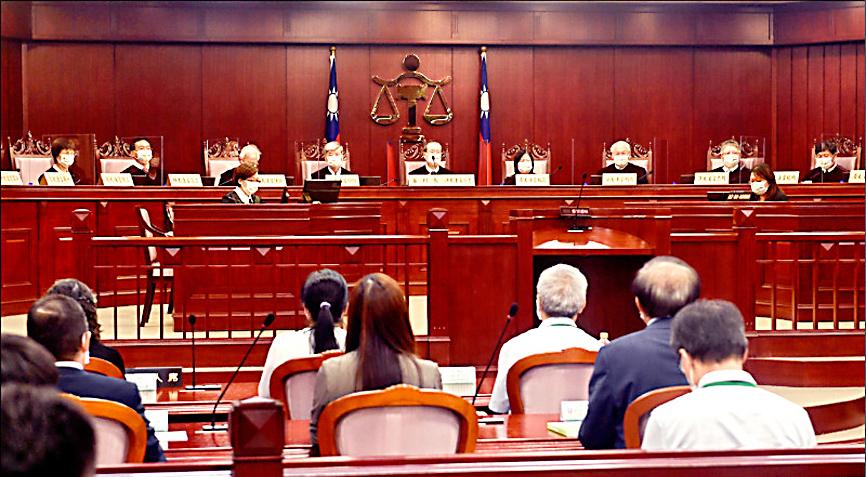The Constitutional Court yesterday ruled that imposing a life sentence or the death penalty for people convicted of selling narcotics is partly unconstitutional.
The authorities have to implement legal amendments within two years to reflect the ruling.
The court reviewed Constitutional Interpretation No. 476 based on 54 complaints stating that Article 4 of the Narcotics Hazard Prevention Act (毒品危害防治條例) only offered polarizing choices and gave judges very little room to adjudicate, potentially contravening articles 7, 8 and 23 of the Constitution.

Photo: Wu Cheng-feng, Taipei Times
Article 4 states that offenders who manufacture, transport or sell Category 1 narcotics are subject to a death sentence or life imprisonment, and may also be fined up to NT$30 million (US$943,456).
As defined by the act, Category 1 narcotics include morphine, cocaine, heroin, opium and their derivative products.
The intent of lawmakers to use life sentences to deter narcotics trafficking and use is evident, but the law fails to consider situations in which the accused is not guilty of other legal contraventions, the offense was minor or the case merits clemency, the judges said in their ruling.
Even if judges invoke Article 59 of the Criminal Code to reduce a defendant’s sentence, the crime would not merit such a heavy sentence, the ruling said.
Article 4 of the act risks being too rigid and inflexible, and the authorities should review the legal sentences that would be appropriate if the crime does not befit the sentence.
The ruling suggested that the authorities introduce fixed-term imprisonment as an alternative ruling or base the prison terms on the amount of narcotics sold and how many times the defendant has been accused of selling the product.
Starting from the day of the ruling until the legal amendments have been completed, any ruling regarding the trafficking of Category 1 narcotics should not only invoke Article 59 of the Criminal Code, but also reduce the already-reduced sentence by half, the court said.
Five of the petitions had been filed by narcotics traffickers and they can demand that the prosecutor general file a petition for an extraordinary appeal, the court said.

The Central Election Commission has amended election and recall regulations to require elected office candidates to provide proof that they have no Chinese citizenship, a Cabinet report said. The commission on Oct. 29 last year revised the Measures for the Permission of Family-based Residence, Long-term Residence and Settlement of People from the Mainland Area in the Taiwan Area (大陸地區人民在台灣地區依親居留長期居留或定居許可辦法), the Executive Yuan said in a report it submitted to the legislature for review. The revision requires Chinese citizens applying for permanent residency to submit notarial documents showing that they have lost their Chinese household record and have renounced — or have never

A magnitude 5.6 earthquake struck off the coast of Yilan County at 12:37pm today, with clear shaking felt across much of northern Taiwan. There were no immediate reports of damage. The epicenter of the quake was 16.9km east-southeast of Yilan County Hall offshore at a depth of 66.8km, Central Weather Administration (CWA) data showed. The maximum intensity registered at a 4 in Yilan County’s Nanao Township (南澳) on Taiwan’s seven-tier scale. Other parts of Yilan, as well as certain areas of Hualien County, Taipei, New Taipei City, Taoyuan, Hsinchu County, Taichung and Miaoli County, recorded intensities of 3. Residents of Yilan County and Taipei received

Taiwan has secured another breakthrough in fruit exports, with jujubes, dragon fruit and lychees approved for shipment to the EU, the Ministry of Agriculture said yesterday. The Animal and Plant Health Inspection Agency on Thursday received formal notification of the approval from the EU, the ministry said, adding that the decision was expected to expand Taiwanese fruit producers’ access to high-end European markets. Taiwan exported 126 tonnes of lychees last year, valued at US$1.48 million, with Japan accounting for 102 tonnes. Other export destinations included New Zealand, Hong Kong, the US and Australia, ministry data showed. Jujube exports totaled 103 tonnes, valued at

BIG SPENDERS: Foreign investors bought the most Taiwan equities since 2005, signaling confidence that an AI boom would continue to benefit chipmakers Taiwan Semiconductor Manufacturing Co’s (TSMC, 台積電) market capitalization swelled to US$2 trillion for the first time following a 4.25 percent rally in its American depositary receipts (ADR) overnight, putting the world’s biggest contract chipmaker sixth on the list of the world’s biggest companies by market capitalization, just behind Amazon.com Inc. The site CompaniesMarketcap.com ranked TSMC ahead of Saudi Aramco and Meta Platforms Inc. The Taiwanese company’s ADRs on Tuesday surged to US$385.75 on the New York Stock Exchange, as strong demand for artificial intelligence (AI) applications led to chip supply constraints and boost revenue growth to record-breaking levels. Each TSMC ADR represents